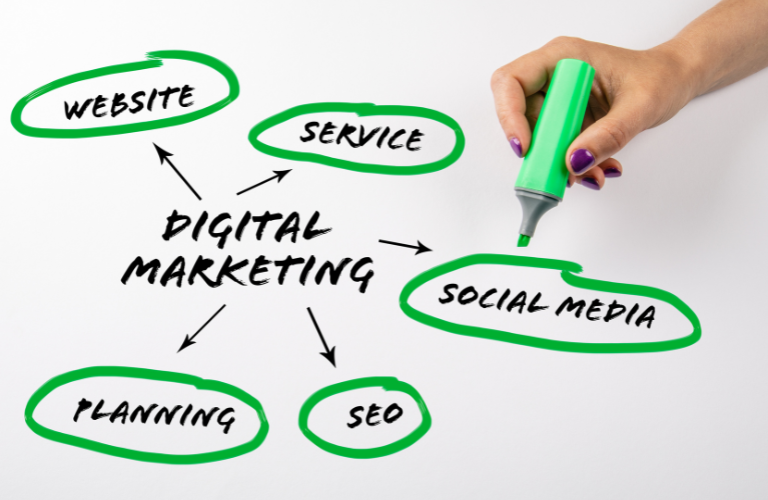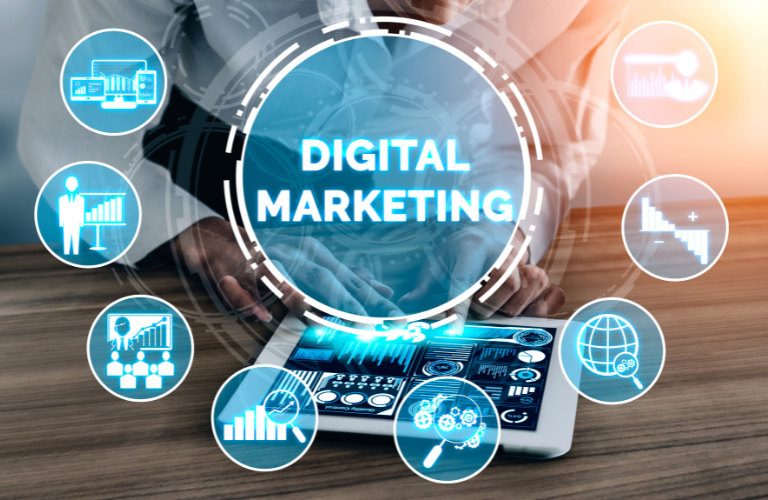Introduction: The Digital Marketing Revolution
In the ever-evolving realm of commerce, digital marketing has emerged as a pivotal force driving business growth. The transition from traditional marketing to digital platforms reflects a significant shift in consumer behavior and market dynamics.
Understanding Digital Marketing:
Digital marketing encompasses a broad spectrum of online marketing functions. It’s an umbrella term covering everything from social media strategy to search engine optimization (SEO), each element playing a critical role in modern business success.
The Power of SEO: Enhancing Online Visibility
A harmonious blend of creativity and analytics, elevates your website’s visibility to search engines, intertwining technical prowess with strategic content curation. Effective SEO strategies propel a website to the top of search engine results, significantly increasing visibility and organic traffic.
Leveraging Social Media for Business Growth:
Social media realms provide unmatched avenues for amplifying brand presence and fostering deep customer connections, blending visibility with interactive experiences. Utilizing these platforms effectively requires a deep understanding of both the medium and the message.
Content Marketing: A Key to Engagement
Content marketing is centered on crafting and disseminating enriching content, designed to captivate and maintain a distinct audience, thereby weaving a narrative that resonates and engages.. The goal is to stimulate interest in products or services through informative and engaging content.
Email Marketing: Personalized Communication
Email marketing involves sending personalized messages to a target audience. It’s a direct and effective way to communicate with potential and existing customers, fostering relationships and encouraging conversions.
Pay-Per-Click Advertising: Maximizing ROI
PPC stands as a distinctive digital advertising paradigm where advertisers invest per user click, unveiling a realm where each click translates into potential engagement and business growth. It’s a way of buying visits to your site, as opposed to earning them organically.
Influencer Marketing: The Power of Endorsement
Influencer marketing focuses on using key leaders to drive your brand’s message to the larger market. It taps into the following of influencers, leveraging their credibility and audience reach.
Video Marketing: Engaging Customers Visually
Video marketing is an innovative, front-line approach, infusing captivating video elements into marketing initiatives, versatile in its application from nurturing customer relationships to elevating your brand, services, or products.
Mobile Marketing: Reaching Customers on-the-Go
Mobile marketing targets audiences through smartphones and tablets. It encompasses a variety of formats including SMS, messages, app-based marketing, and mobile web browsers.
Analytics and Data-Driven Marketing:
Data-driven marketing encompasses strategies sculpted from deep-diving into big data insights, gleaned from myriad consumer interactions and engagements, forming a mosaic of informed decision-making. This data guides strategy development and decision-making.

User Experience (UX) and Digital Marketing:
UX in digital marketing focuses on the overall experience a user has with your brand, website, or app. An exceptional UX can lead to improved customer satisfaction and increased conversion rates.
Brand Building :
Digital branding is the process of establishing your brand’s presence and identity in the digital space. It’s about creating a unique image and voice for your brand that resonates with your target audience.
E-Commerce and Digital Marketing Synergy:
In the realm of e-commerce, digital marketing plays a crucial role in driving traffic and conversions. It involves a blend of various marketing tactics tailored to the e-commerce industry.
The Role of AI and Automation in Digital Marketing:
AI and automation are transforming digital marketing by making processes more efficient and insights more actionable. From chatbots to personalized marketing messages, these technologies are enhancing the marketing landscape.
Digital Marketing for B2B Businesses:
Digital marketing for B2B focuses on building valuable relationships and demonstrating the value of your products or services to other businesses. It often involves more informational and professional content.
Budgeting for Digital Marketing:
An effective digital marketing strategy requires careful budget planning. It’s about allocating resources where they will be most effective, whether that’s in SEO, social media, or content creation.
Navigating the Legal Landscape of Digital Marketing:
Understanding the legal considerations, including data privacy laws and advertising regulations, is crucial in digital marketing. It’s about balancing aggressive marketing tactics with ethical and legal standards.
Future Trends in Digital Marketing:
As continues to evolve, staying ahead of trends like voice search optimization, AI, and immersive technologies is vital for businesses looking to maintain a competitive edge.
Conclusion:
To harness the full potential of digital marketing, businesses must integrate these strategies into their broader marketing and operational plans. It’s not just about adopting new technologies but about evolving with the digital landscape to ensure sustainable business growth.




